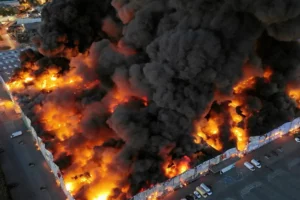The German government seeks to prepare for potential future pipeline disruption by doubling Baltic LNG import capacity.
The German government plans to expand its imported liquefied natural gas (LNG) capacity on the Baltic island of Rügen by at least double. The country seeks to reduce reliance on Norwegian LNG amid fears of Russian pipeline attacks.
In September 2022, Nord Stream gas pipelines between Russia and Germany ruptured during “unexplained” blasts. Some intelligence agencies now believe that Ukrainian forces, independent of the state, sabotaged the pipeline, although this remains both unclear and disputed. German Chancellor Olaf Scholz fears further attacks on underwater infrastructure could occur. Sources familiar with the matter told Bloombergthat Scholz has been preparing for potential disruptions.
The controversial Baltic LNG terminal is due to open in early 2024, with one floating terminal and a floating LNG ship. The project has been criticised by environmentalists and the subject of protests. Discussions with Deutsche Regas, a private company that operates a separate facility in Lubmin, remain ongoing.
Norway accounts for approximately one-third of Germany’s natural gas imports following sanctions placed on Russian fuel exports after the invasion of Ukraine. Damage to the infrastructure links between Norway and Germany could affect energy security and supply.
Speaking in Berlin earlier this week, economy minister Robert Habeck said that: “We have to expect things to happen again […] should a pipeline system somewhere fail again, or should gas supply be stopped again”.
German Reliance on LNG
Germany relies heavily on LNG to fill its energy supply gap. According to a report from the non-profit German Institute for Economic Research, “energy supply in Germany is secure even without natural gas from Russia”. Given increased supply from the EU, authors suggest that “the planned construction of onshore liquefied natural gas terminals is neither necessary in terms of the energy industry nor sensible in terms of climate policy”.
Germany’s return to natural gas has been criticised by environmentalists, including Habeck’s own Green Party voters, who consider his position as going against key party principles.
Olaf Bandt, head of Bund, one of Germany’s largest environmental organisations, described Habeck’s position as “shocking”, “because we and the Greens campaigned for years against fracking gas from the US and against new LNG infrastructure in Germany”.
Three LNG import terminals started operations this winter, with six more expected in the coming years. The government has earmarked $11bn (€10bn) for this expansion. The EU aims to have enough capacity to be able to fully replace Russian fossil fuel imports by 2030.
Source : Offshore Technology















